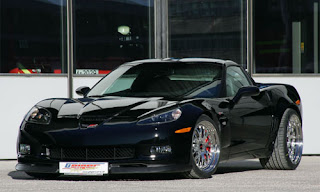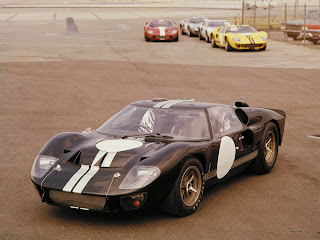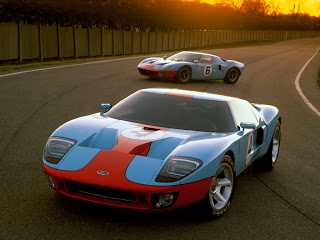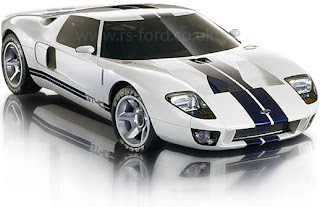 Famously, this was the car that Ford developed to kick Ferrari's butt after the Italian maker decided against selling out to the Blue Oval. A one-two-three finish at Le Mans made the point rather neatly, and this remains the most inspired car that Ford has ever produced. And even though it's a loud Yank, you voted for it. Well done!
Famously, this was the car that Ford developed to kick Ferrari's butt after the Italian maker decided against selling out to the Blue Oval. A one-two-three finish at Le Mans made the point rather neatly, and this remains the most inspired car that Ford has ever produced. And even though it's a loud Yank, you voted for it. Well done!
Mustangs, Thunderbirds and F-series pickups are all legendary Fords that have populated America's highways for decades. Numbering in the millions, they're recognizable to just about everyone. For motorsports fans or those familiar with Ford's racing heritage, however, there's a lesser known but equally iconic "halo" model that best represents the technological capabilities of the marque: the exotic limited-production Ford GT sports car.
Arriving in prototype form just in time for Ford's Centennial celebration in 2003, the Ford GT debuted for 2004 as the modern, road-going interpretation of the GT40 endurance racing car that beat Ferrari and swept the 24 Hours of Le Mans race four years in a row from 1966-'69. The ultrahigh-performance two-seat Ford GT was produced from 2004 through 2006 and showcased many advanced technologies, befitting its $140,000 price tag. It sported a supercharged mid-mounted V8 engine, an aluminum chassis, superplastic-formed aluminum body panels, a capless fuel filler, cross-drilled Brembo brakes and a carbon-fiber engine cover. Not only did these exotic features showcase a technological tour de force, they also formed a visual feast once the large rear engine cover was opened.

After climbing inside -- a process made awkward by the GT's pronounced door frames that extend well into the roof -- the driver and lucky passenger enjoy surprisingly roomy accommodations for even 6-plus-footers. The cockpit offers a satisfying blend of old and new -- the wide gauge cluster with center-mounted tach, the red starter button, a metal shift knob, large toggle switches and carbon-fiber seats remind you of its more primitive heritage, while the magnesium center console and illuminated climate controls lend a modern and civilized touch. As you might expect, rear visibility is a weak point, but it's a trade-off we have no problem accepting.
 Once underway, however, whatever ergonomic shortcomings the GT may have disappear as quickly as the road in its rearview mirror. Surprisingly, its drivability and user-friendliness is closer to that of a typical sport coupe than a high-performance sports car. The clutch pedal and shifter operate smoothly, the well-balanced steering provides excellent feedback and the engine remains civilized when idling through traffic. But the Ford GT really comes into its own when driven with gusto on the road or at the track, with blistering 3.5-second 0-60-mph performance and a reassuring combination of stability and confidence in place of the typical nervousness exhibited by some other exotics. As we said in our review, "think of it as a Viper-powered NSX with the daily drivability of a Corvette." In other words, the Ford GT is one of the most capable cars ever produced, with at-the-limit manners that not only give it an advantage over direct rivals, but also the ability to compete with supercars costing much more
Once underway, however, whatever ergonomic shortcomings the GT may have disappear as quickly as the road in its rearview mirror. Surprisingly, its drivability and user-friendliness is closer to that of a typical sport coupe than a high-performance sports car. The clutch pedal and shifter operate smoothly, the well-balanced steering provides excellent feedback and the engine remains civilized when idling through traffic. But the Ford GT really comes into its own when driven with gusto on the road or at the track, with blistering 3.5-second 0-60-mph performance and a reassuring combination of stability and confidence in place of the typical nervousness exhibited by some other exotics. As we said in our review, "think of it as a Viper-powered NSX with the daily drivability of a Corvette." In other words, the Ford GT is one of the most capable cars ever produced, with at-the-limit manners that not only give it an advantage over direct rivals, but also the ability to compete with supercars costing much more
0 comments:
Post a Comment